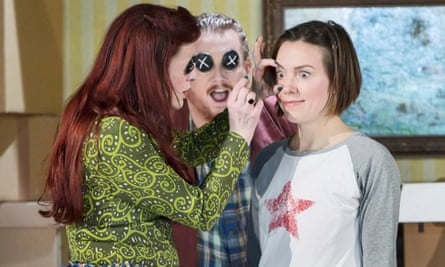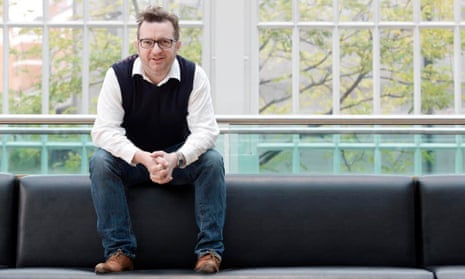A spat on Twitter that turned toxic appeared to lead to a declaration from composer Mark-Anthony Turnage that he is to write no more operas.
Turnage is one of the UK’s leading composers who has written numerous orchestral and chamber works, and three full-length operas, including Anna Nicole, which premiered at the Royal Opera House in 2011.
His newest work, a chamber opera for children, Coraline, based on Neil Gaiman’s novel, finished a run of sold-out performances at the Barbican in London on Saturday, but met a mixed critical response. The Observer’s Fiona Maddocks felt it was overlong, but praised the cast and staging, writing. “With some text trims and ... judicious use of surtitles, it could triumph.”
The Guardian’s Tim Ashley, in a four-star review, noted that the children in the audience enjoyed it but added: “Turnage has long divided opinion, and not everyone, I suspect, will like it.”
Indeed, the Telegraph’s opera critic Rupert Christiansen did not pull his punches. “Turnage’s score is grey, sluggish and lacking in either charm or spookiness,” ran his review.
Hugh Canning, the Sunday Times’s opera writer – although this was not a production he was reviewing himself in a formal capacity – added in a tweet since deleted that he thought that Christiansen’s comments were “spot on”.
He’s definitely right. They all know far more than I do about writing music. I’m an amateur. I’ve been found out. https://t.co/pkvvLBKS1w
— Mark-Anthony Turnage (@TurnageTime) April 6, 2018
“He’s definitely right. They all know far more than I do about writing music. I’m an amateur. I’ve been found out,” wrote Turnage in response.
The following day, ahead of his opera’s final performance of this current run, Turnage, who in 2015 was awarded the CBE for services to music, wrote a tweet to Canning and Christiansen which said: “Don’t worry Hugh. There will be no further operas by me that you will ever have to sit through again. I’m done with the genre. Going to leave it [sic] my more talented contemporaries and younger colleagues.”
Canning replied: “I’m sorry to hear that. I’ve been a big fan of your earlier pieces. Can I suggest a few cuts in Act 1 & a sprinkling of fairy-dust on the orchestration?”
I'm sorry to hear that. I've been a big fan of your earlier pieces. Can I suggest a few cuts in Act 1 & a sprinkling of fairy-dust on the orchestration? 😈
— Hugh Canning (@hugh_canning) April 7, 2018
The critic’s response was heavily criticised by opera singers including British tenor Paul Curievici, who was not involved with the production. He wrote: “The shared-space-ness of Twitter is tricky, and this is one incident among several in which the right tone has seemed hard to land on ... Opera twitter prompting one of our most garlanded composers into abandoning the art form does not make me feel good about opera twitter.”
The tenor Ben Johnson tweeted: “Where does a critic get off directly (publicly) writing to a composer of this standing in such a way?”
Canning apologised, writing that his remark was “meant to be humorous” and pointed to the positive and measured review of the production – by his fellow classical music critic Paul Driver – that was published in the Sunday Times. “Obviously, it’s concerning that a composer I admire may not write any more operas because of an off-the-cuff tweet I had intended light-heartedly,” he told the Guardian. “I really didn’t expect Mark to take my suggestions seriously – especially as my enthusiasm for his earlier operas, Greek, The Silver Tassie and Anna Nicole, is a matter of record.”

The incident caused some musicians to ponder the relationship between musicians and critics on Twitter. The mezzo soprano Jennifer Johnston said on the site: “Don’t you think critics should be impartial? And tread carefully on Twitter, rather than blurring the lines and continuing their paid job into the private sphere?”
In a further tweet, Turnage clarified his position a day later: his declaration to stop writing operas was not in response to the reaction to Coraline, but something that he decided “some time ago”. He declined to comment further for the Guardian.
